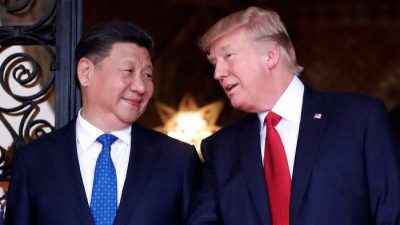US-China Relations on the Rocks?

Both right wings of the US war party are hostile toward sovereign independent states that are free from its imperial control.
It’s notably true for nations with enormous hydrocarbon resources like Iran and Venezuela — what the US seeks control over for added ability to dominate other countries.
Most of all, it’s true for powerful nations like China and Russia, able to challenge US hegemonic aims effectively.
Russia’s super-weapons, exceeding the best in the West, made it the world’s dominant military power.
China’s growing economic, industrial, technological, and political power most concerns US policymakers because of the country’s increasing preeminence on the world stage at the expense of America in decline.
In their eyes, China is public enemy No. 1. Are both countries on a collision course for confrontation?
A rupture in political relations could follow the Trump regime’s trade war.
It’s exacerbated by unacceptable Pentagon incursions close to and in Chinese waters, and now falsely blaming Beijing for spreading COVID-19 outbreaks to shift responsibility from US failures to deal with the public health crisis effectively.
Intense China bashing affects US public opinion. A February Gallup poll showed two-thirds of Americans view Beijing mostly or very unfavorably — a 20 point decline from 2018.
A March poll by the organization showed nearly half of US respondents view China as a “critical threat.”
A new Pew Research poll showed two-thirds of Americans view China unfavorably. When Trump took office, it was 47%.
According to Asia Society’s director Orville Shell, “(i)t’s hardly surprising.”
“It’s now just about the only thing in Washington that Republicans and (Dems) agree on…(They) have a much more skeptical view of China’s intentions” — ignoring their own.
Negative US public opinion toward China shows propaganda works as intended.
According to former US National Security Council member Douglas Paal, proposed congressional legislation calls for greater get tough on China policies.
It’s an election issue. Congressional members and aspirants believe that publicly bashing China is a way to gain voter support.
Bilateral relations are likely to worsen ahead, including in the aftermath of US November elections — heightening the risk of confrontation by accident or design.
The outlook ahead is unsettling at best, a matter of great concern if bilateral relations continue deteriorating.
A rupture will be harmful to both countries. The US is China’s largest export market. It’s a major market for US exports.
According to the St. Louis Fed, agricultural products, aircraft, motor vehicles, and microchips are the top US exports to China.
The country is the world’s leading source of low-cost goods for the US and many other nations. It’s a major buyer of US Treasuries.
In response to growing contentious relations with the US, China began developing internal consumer-led growth years ago, including for services — to be less dependent on exports for future growth, especially to the West.
Has Russiagate shifted to Chinagate? US anti-China Cold War poses the risk of turning hot.
Is mutual trust beyond repair short-or-longer-term?
The issue goes way beyond Trump and GOP hardliners. If Biden succeeds DJT as president in January, Sino/US relations are unlikely to improve.
Given the current trend, they’re more likely to further deteriorate.
Obama’s 2013 Asia pivot aimed to reassert America’s East Pacific presence by advancing its military footprint in a part of the world where it doesn’t belong.
It aims to challenge and counter China growing preeminence on the world stage, while checking Russia in its far east at the same time.
Containment has been US policy throughout the post-WW II period, targeting nations able to challenge its hegemonic aims.
Cold War politics rages on multiple fronts, mainly against China and Russia — in the Middle East against Iran, in Latin America against Venezuela, Cuba and Nicaragua.
It’s what the scourge of Washington’s imperial agenda is all about, risking endless wars by hot and other means.
US imperial overreach threatens everyone everywhere.
What’s unthinkable is possible, the risk of military confrontation with China and/or Russia that could go nuclear if pushed too far.
*
Note to readers: please click the share buttons below. Forward this article to your email lists. Crosspost on your blog site, internet forums. etc.
Award-winning author Stephen Lendman lives in Chicago. He can be reached at [email protected]. He is a Research Associate of the Centre for Research on Globalization (CRG)
His new book as editor and contributor is titled “Flashpoint in Ukraine: US Drive for Hegemony Risks WW III.”
http://www.claritypress.com/LendmanIII.html
Visit his blog site at sjlendman.blogspot.com.

